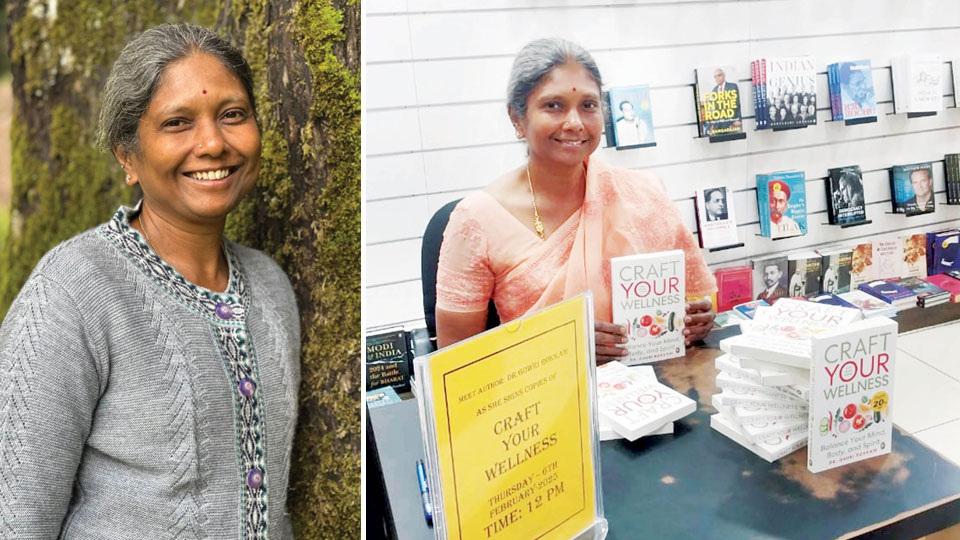Dr. Gauri Rokkam advocates whole foods for wholesome health
This interview stands apart from others featured in Star of Mysore on the occasion of International Women’s Day. While we have highlighted women excelling in fine arts, theatre, mountaineering, vehicle repair, the entertainment industry, medicine, food and courier delivery, this feature — last in the series — takes a different path. It focuses on a woman dedicated to promoting a healthy lifestyle through whole plant-based and naturally unrefined foods.
Dr. Gauri Rokkam, a Bengaluru-based Holistic Whole Food Plant-Based Nutritionist, has been conducting workshops, talks and sessions to inspire people to embrace healthy eating habits for lifelong wellness. Her mission is to empower individuals to become health champions by making informed, nourishing choices. Star of Mysore caught up with Dr. Gauri Rokkam for a brief interview. —Excerpts
By S.N. Venkatnag Sobers
Star of Mysore (SOM): What inspired you to pursue research in Food and Nutrition?
Dr. Gauri Rokkam: My father, K.V. Narayana, a Biochemistry Professor, was my primary inspiration. He was passionate about drugless therapies, especially nature cure and yoga.
He would invite experts from across India and the world to conduct courses, workshops and lectures at our home. As children, we didn’t fully understand it, but the exposure left a lasting impression.
When I completed my Pre-University, I struggled with Mathematics. My father cleverly suggested I take up Home Science, saying it would be useful in the future. Following his advice, I graduated in Home Science with a major in Food and Nutrition.
SOM: Did you immediately pursue further studies and research after graduation?
Dr. Gauri: No, I got married soon after graduation. It was only 14 years later that I decided to return to my studies and pursue a Master’s degree. My motivation was to ensure I was making the best food choices for my children.
As I delved deeper into food research, I realised that the textbook knowledge often contradicted the principles of food philosophy, nature cure and yogic traditions. Back then, without the internet, I had to meet experts from different fields to clarify my doubts. These enriching interactions fuelled my passion and ultimately led me to pursue a Master’s in Food and Nutrition.
SOM: Tell us about your research on coconut.
Dr. Gauri: My husband, Shankar, encouraged me to continue my research. With countless topics to explore, I was drawn to coconut due to the conflicting views between nature cure, yogic philosophy and modern medical nutrition.
At the time, many of my clients mentioned that their doctors had advised them to avoid coconut due to its high cholesterol content. Scientifically, coconut is composed of 92 percent saturated fat, which is known to clog arteries and increase the risk of cardiovascular diseases. As a result, coconut was labelled as harmful to heart health.
However, I was sceptical. In India, coconut is revered as a complete food and in yoga, it is considered sattvic. This contradiction intrigued me, leading me to research further. I discovered that although coconut is high in saturated fat, it contains medium-chain fatty acids (MCFAs), which are metabolised differently.
Instead of entering systemic circulation, MCFAs go directly to the liver, where they are converted into energy. Since they bypass the bloodstream, they do not affect heart health. After eight years of research, we were able to prove this and our findings were published by the American College of Nutrition.
SOM: You’ve expanded into various spheres while keeping nutrition as your core focus. Tell us more about it.
Dr. Gauri: My father inspired me to study both nature cure and yoga. Yoga, beyond physical postures, is a profound philosophy — it’s about bending the mind, not just the body. Both nature cure and yoga complement my work in nutrition.
In health, ‘ahara’ (food) alone isn’t enough. We also need ‘vihara’ (lifestyle) and ‘vichara’ (mindset) to achieve complete well-being. True health comes when all three are in balance.
As I studied modern medical nutrition, I was puzzled by the contradictions. This drove me to explore the philosophies of nature cure and yoga more deeply. By integrating these three disciplines, I developed a specialised approach that helps people prevent and even reverse diseases.
SOM: There have been recent claims about reversing diabetes. Is there any truth to them or are they just exaggerated claims?
Dr. Gauri: These are not exaggerated claims. Naturopathy has been advocating the reversal of diabetes for ages, although it is often undervalued. Across the country, naturopaths have successfully demonstrated that type 2 diabetes can indeed be reversed.
Many of our clients have overcome the condition and are now living diabetes-free. In naturopathy, we treat the root cause, not just the symptoms. High blood sugar is merely a symptom, yet conventional medicine focuses on lowering it rather than addressing the underlying issue — the pancreas’ reduced ability to produce insulin. Instead of relying on drugs that stimulate the pancreas and cells, we focus on healing the pancreas by giving it rest, allowing it to rejuvenate and function properly.
We also work on reducing insulin resistance at the cellular level using ‘ahara’, ‘vihara’ and ‘vichara’. This holistic approach makes it possible to reverse diabetes.
SOM: You describe yourself as a Holistic Whole Food Plant-Based Nutritionist. What does that mean?
Dr. Gauri: The key is in the three words: holistic, whole food and plant-based. Holistic means viewing the body as a single, interconnected unit. You can’t isolate organs and treat them separately. For example, if the kidneys aren’t functioning well, you can’t just focus on feeding them specific nutrients — because the entire body system works in synergy. What benefits one organ may impact another, which is why I consider the body as a whole.
Whole food refers to eating food in its natural form, without breaking it down into individual components. Each meal should contain all seven essential nutrients the body needs. The goal is to maintain the food’s natural complexity rather than relying on reductionist theories that isolate specific nutrients.
Plant-based is exactly as it sounds — focusing on plant-derived foods that are as close to their natural state as possible. This means avoiding refined and processed foods and instead consuming food in its original, wholesome form, just as nature provides it.
SOM: As a Nutritionist, how do you determine a person’s diet or nutritional plan?
Dr. Gauri: My role is to ensure people get all the essential nutrients from their food. I teach them how to achieve this, but I don’t dictate recipes, meal patterns or portion sizes. Unfortunately, Nutritionists are often expected to prescribe food quantities, but that’s not my approach.
Instead, I educate people on how to obtain all necessary nutrients, even from simple meals like roti. Once they understand how to meet their nutritional needs, my job is done. I also guide them to listen to their bodies — learning to recognise when they are hungry or full — rather than following rigid portion controls.
SOM: Can you tell us about the awareness work you’ve been involved in over the past few years?
Dr. Gauri: I regularly conduct monthly workshops at home, combining theory with practical cooking sessions. This hands-on experience allows participants to understand the principles of nutrition and apply them immediately. My goal is to create a ripple effect — when I educate one person, they influence their family and friends, helping more people adopt healthier lifestyles.
Beyond workshops, I offer personal consultations and give lectures on various health topics, diseases and the role of food in healing. I also run courses on holistic nutrition and a health certification programme. These are attended by doctors, nurses, yoga therapists, physiotherapists and even lay people interested in health.
I believe the media plays a vital role in spreading this awareness. When the public understands the benefits of switching from refined to whole foods, it naturally leads to positive health changes.








Recent Comments